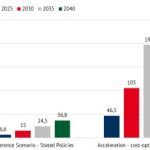Christoph Kellermann, Lun Zhou and Simon Göss at Energy Brainpool explain how the EU’s new “Fit for 55” proposals, released in July, will impact the EU Emissions Trading Scheme (EU ETS), hailed as one of the most effective ways of reducing emissions. The authors cover the changes to the existing ETS, the planned new ETS for road transport and buildings, the controversial Carbon Border Adjustment Mechanism (CBAM), and the new CO2 standards for … [Read more...]
‘Fit for 55’ should prioritise decarbonisation of laggards: buildings, transport, industry, agriculture
Today’s long-awaited "Fit for 55" legislative package from the European Commission will trigger intense and difficult negotiations that will last two years, says Nicolas Berghmans at IDDRI. Its scope is wide and inevitably interconnected. The twelve legislative proposals include adjustments to existing measures (renewable energy, energy efficiency, carbon market/EU ETS, energy taxation, climate effort sharing between Member States/ESR, land use … [Read more...]
UK: exposing the gap between ambitious climate laws and actual policies
Like many nations, the UK has big gaps between what is actually needed to reach net zero by 2050, what targets and ambitions have actually passed into law, and what policies are actually in place to comply with those laws. The UK’s climate watchdog, the Climate Change Committee (CCC), has issued two reports that measure the UK’s performance and makes recommendations, summarised here by Josh Gabbatiss at Carbon Brief. The first report focuses on … [Read more...]
Cement: replacing limestone with volcanic rock could slash energy use, and emissions by two-thirds
Cement production accounts for 8% of global emissions, and it will rise as nations get richer and build more. It’s mainly because of the energy needed for the high heat process, and the carbon released from the limestone used. It’s one of the leading hard-to-abate sectors, and coming up with an alternative process and cement recipe is firmly on the industry’s agenda. Josie Garthwaite at Stanford University summarises a study that aims to replace … [Read more...]
EU’s Carbon Border Adjustment Mechanism lacks the detail to drive industry’s relocation near clean energy
High emissions industries should be relocated to where the cheap clean energy is. So long as the shipping costs (in terms of price and emissions) aren’t prohibitively high, those locations can be anywhere in the world. To get the calculations right, Carbon Border Adjustment Mechanisms (accounting for the emissions of imported goods) must be harmonised internationally. They must also – crucially – count all relevant emissions. But the EU’s draft … [Read more...]
The EU’s “Fit for 55” package: a primer on the EU ETS and other main policy levers
On July 14 the European Commission will present the much awaited “Fit for 55” legislative package. Lara Dombrowski and Simon Göss at Energy Brainpool have written a very useful primer on what’s at stake for the EU ETS, along with a summary of the other main policy levers that will be decided upon. The authors describe the EU ETS as the central instrument for reducing greenhouse gas emissions. It caps emissions for 10,000 power sector, industrial … [Read more...]
Does new German target mean Coal gone by 2029, Renewables 65% by 2030?
The stiffer emissions targets introduced this month to Germany’s Climate Protection Law - CO2 emissions from the energy industry must fall to 108 Mt by 2030 instead of 175 – point to an even earlier coal phase-out date of 2029, with renewables generating 65% of electricity by 2030. The existing plan had meant coal must be gone by 2038. Michael Claußner, Carlos Perez-Linkenheil and Simon Göss at Energy Brainpool explain why, using their modelling … [Read more...]
Where to start building Hydrogen pipelines? Near industrial hubs for steel, ammonia, and plastics
Converting gas pipelines to carry hydrogen is going to be expensive. We don’t even know how much hydrogen we’ll really need in 2050, given electrification – the cheaper and preferred option to replace fossil fuels – will always be the first option. But we do know that certain industries like steel, ammonia, and plastics will always need hydrogen as a feedstock. Writing for WEF, Kevin Tu, Matthias Deutsch and Gniewomir Flis at Agora Energiewende … [Read more...]
EU-India cooperation: how to tap the large potential for climate action
India is the world’s fifth largest economy, the second most populous, and over the next few decades is expected to see energy demand grow more than any other country. Ritu Ahuja and Mekhala Sastry at TERI, Abhishek Kaushik at the Centre for Global Environment Research, and Alexandra Deprez and Lola Vallejo at IDDRI look at India’s challenges and which areas show the most potential for partnership with the EU. They focus on five themes: energy, … [Read more...]
Biden’s Leaders Summit: turning climate commitments into solutions
President Biden's Leaders Summit on Climate last month helped focus minds on making firm commitments to reducing global emissions. As we all know, targets are one thing, credible and realistic solutions are another. To understand the challenge better, Dolf Gielen, Ricardo Gorini and Gayathri Prakash at IRENA break down into themes those areas that need much more effort and, if dealt with successfully, can get us to net zero by 2050: structural … [Read more...]
German Hydrogen scenarios: 271 TWh of Green Hydrogen by 2040?
Germany is putting in place plans and legislation to launch its green hydrogen economy. Sila Akat and Simon Göss at Energy Brainpool look at the laws and regulations, existing and expected soon, that are driving this game-changing ambition. They have also created five scenarios (two are explained in detail here) for production, based on those plans. The reference “Stated Policies” scenario predicts an increase of electrolyser capacity to 5 GW by … [Read more...]
Green EV Batteries: tighter rules can advantage and boost manufacturing in Europe
Policies like the “green” labelling of EV batteries would give a significant advantage to European manufacturers, as well as accelerate the cleaning up of the supply chain. EU firms are better than most foreign battery manufacturers at monitoring and reducing emissions, writes Carole Mathieu at the IFRI Centre for Energy & Climate, referencing her report “Green Batteries: A Competitive Advantage for Europe’s Electric Vehicle Value Chain?” The … [Read more...]
Carbon Capture in Germany: are industry, government and innovators starting to move?
For two years there was little movement after German Chancellor Angela Merkel put carbon capture, removal, and storage back on Germany’s agenda. But the past few months have seen pressure build for a launch of CCS that may model itself on Germany’s success with solar, explains Lee Beck writing for Atlantic Council. Political voices both within and outside government, as well as investments by giants like Heidelberg Cement and Linde, are giving … [Read more...]
China: decoupling GDP growth from rising emissions
To set up this week’s important online event (Tuesday 13th & Wednesday 14th April) “China: Carbon Neutral by 2060 -EFFICIENCY FIRST” we have an overview of China’s energy transition. Everyone agrees its performance is critical for the world to achieve the global goal of limiting warming to 1.5C by 2050. China made significant progress in 2020 with policy frameworks, renewable capacity additions and EVs, but it also added 38 GW of new … [Read more...]
Buildings Efficiency in China, and what EU partners should know
To set up our upcoming online event (April 13th & 14th) "China: Carbon Neutral by 2060 -EFFICIENCY FIRST” we look at how Buildings Efficiency is being tackled by Energy Management Contracting (EMC), when an ESCO (energy service company) provides energy retrofit services and gets paid for the future energy savings. The up-front investment cost is recouped over the multi-year lifetime of the service contract by taking a cut of the genuine … [Read more...]
- « Previous Page
- 1
- …
- 4
- 5
- 6
- 7
- 8
- 9
- Next Page »
















